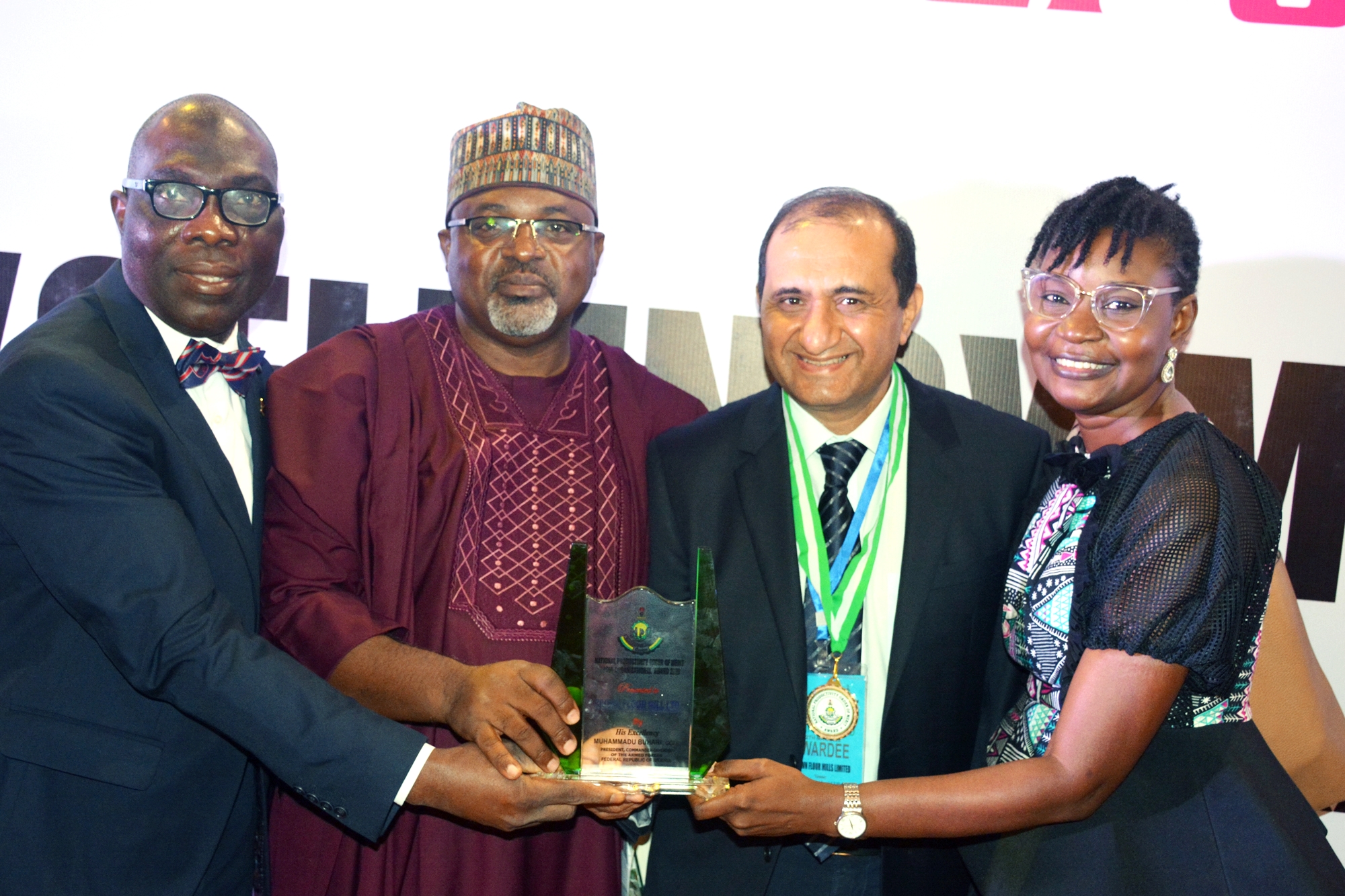Promotions
Crown Flour Mill receives the National Productivity Order of Merit Award from President Muhammadu Buhari 👏🏾👏🏾

President Muhammadu Buhari presenting the 2022 National Productivity Award to Crown Flour Mill (CFM), represented by the Managing Director, Ashish Pande, during the 2022 National Productivity Order of Merit Award Ceremony held at the State House Banquet Hall in Abuja on Thursday, May 12, 2022.
When Ashish Pande, the Managing Director of Crown Flour Mill (CFM), the flour milling subsidiary of OlamAgri, a strong investor in the Nigerian agriculture value chain, rose to the podium to receive the National Productivity Order of Merit Award from President Muhammadu Buhari on May 12 in Abuja, the rapt applauses from the country’s finest business leaders present at the occasion confirmed the recognition was well-deserved.
The enthralling ovation was also proof that bold businesses can set themselves on the path to sustained national relevance through a commitment to raising market standards and delivering consistent impressive performances that impact the livelihood of the citizens.
In the wheat value chain, the efforts of CFM, in collaboration with vital local and global partners are remarkably galvanizing actions towards improved local wheat production. The business’ scaled investment in seed trial and research, distribution of farming inputs to local wheat farmers and the stimulation of wider adoption of mechanized farming techniques among smallholder farmers is spurring increased harvest yield. In 2021, an estimated 847 tonnes of wheat were collected for off-take by members of the flour milling association and of which CFM is a key member.
The business strategic approach to developing the wheat value chain recently triggered a pivot to deepening the stakeholder engagement in the value chain through a consultative forum – webinar series tagged the Olam Green Land Webinar Series.

President Muhammadu Buhari flanked by Managing Director, Crown Flour Mill (CFM) Ashish Pande (left), and Minister of Labour and Employment, Dr. Chris Ngige, at the presentation of the National Productivity Order of Merit Award to CFM, held at the State House Banquet Hall in Abuja on Thursday, May 12, 2022.
Since the year 2021, the flour milling firm has channelled significant investments in bringing together top officials from the Federal Ministry of Agriculture and Rural Development (FMARD), the Central Bank of Nigeria (CBN), the Lake Chad Research Institute (LCRI), and global experts in plant breeding and genetics to discuss ways to improve local wheat production in Nigeria.
Under the auspices of its signature and flagship wheat value chain development vehicle christened “Seeds for the Future” Programme, the business undertakes interventions in research and development, innovation, education, and economic empowerment, on a sustainable basis. The programme kicked off with wheat seeds trial project in 2021. On the project, CFM is committing N300 million ($750,000), one of the largest private investments in the wheat value chain, to drive the country closer to its aspiration of attaining self-sufficiency in wheat production.
The programme involves a strategic partnership with the national agriculture research agency and renowned global experts in plant genetics to conduct a wider trial of heat-tolerant seeds as well as training local smallholder farmer women cooperative members across the wheat farming belts as seed-multipliers.
It is estimated that the programme will engage at least 10,000 farmers as seed multiplicators who will cultivate about 100,000 ha of land with high-yielding seed varieties by 2030. An estimated 200,000 tonnes of seeds are expected to be generated in the process for multiplication and commercialisation with a stronger impact on the income levels of smallholder farmers in Nigeria.
Also, recently, under the Seeds for the Future Programme, CFM embarked on the upgrade of a school in indigent communities to provide sound academic foundations for future leaders of the country as part of an overall focus on the development of Nigeria through the Seeds for the Future initiative. Similarly, as part of concerted efforts to help improve wheat cultivation in the wheat farming belts, the business donated irrigation facilities including pumping machines to female wheat farmers in key locations also in the year 2021.

L-R: Head, Human Resources, Moshood Quadri; Head Corporate Affairs and Government Relations, Datti Danjuma; Managing Director, Ashish Pande; all of Crown Flour Mill (CFM); and Corporate Affairs Manager, Olam Nigeria, Damilola Adeniyi, displaying CFM’s National Productivity Order of Merit Award Plaque at the Awards Ceremony in Abuja, on Thursday, May 12, 2022.
CFM is at the fore of providing affordable and safe food brands for Nigeria’s teeming population. It was among the first food manufacturers in Africa to deploy a Vitamin Premix facility in its factories to ensure all its food brands contain essential minerals as stipulated in the global Micronutrient Fortification Index (MFI). For that valuable effort, the firm received the award of Industry Leader in Quality Systems and Fortification in the year 2021.
Meanwhile, it is in the areas of generating good jobs for the economy and providing top working conditions for its employees that perhaps CFM is having the greatest impact. Apart from being a formidable part of the Olam Agri Group that ensures over 5 million smallholder farmers across the globe continue to access a ready market for their outputs and earn stable incomes for their produce, the business employs local talents from various fields in Nigeria.
Most notably, between the years 2020 and 2021 CFM invested N120 million in training 1,500 local bakers in modern baking practices. It is setting up well-equipped baking schools in select states of the country to engage more bakers. The training received during the programmes is helping to improve productivity levels as well as generate good incomes for more local households.
The business also demonstrated its support for environmental sustainability by engaging in a tree-planting campaign in the year 2021, as part of concerted efforts aimed at reducing its carbon footprint.
Considering the over 10,000 smallholder farmers to be engaged in the Seeds for the Future programme, the number of bakers trained annually in CFM baking schools, the supply chain players in the retail sectors stocking the firm’s popular food brands, the multiple scientists and researchers working for the firm at the production level of the value chain, and an impressive line of administrative officers sourced from all the geopolitical zones of the country running the business amongst others, CFM is a great enabler of a robust national economic performance.
Emphasizing the value of productive contribution to the economy, President Muhammadu Buhari explained at the awards ceremony: “Productivity is a vital determinant of economic growth, social progress and improved standards of living.”
The business has committed to ensuring that its production rate will continue to reflect on the national gross domestic production (GDP) rating.
Sponsored Content





















